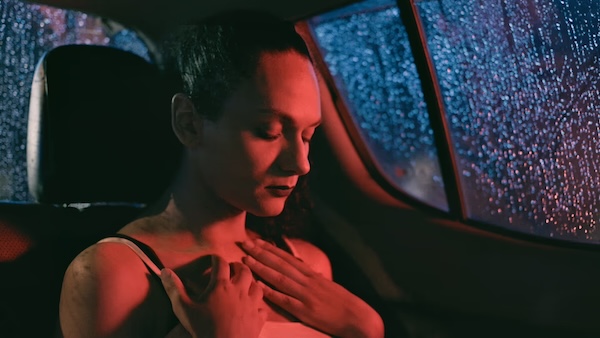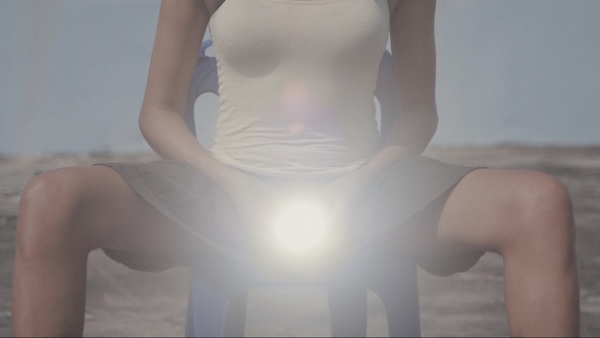Film Review: Trans Valuation at Wicked Queer 41
By Peter Keough
Director Victoria Verseau’s Trans Memoria is an oneiric, brutally frank meditation on the pains and rewards of transgender surgery.
Wicked Queer 41, through April 13 at the Brattle Theatre, the Coolidge Corner Theatre, the Museum of Fine Arts, the Institute of Contemporary Art, Massachusetts College of Art and Design, and the ArtsEmerson Paramount Center.

A scene from Victoria Verseau’s Trans Memoria.
Every year the Wicked Queer Film Festival screens one or two or more documentaries that will make it onto my 10 best list (in 2024 there were two: Queendom and S/He Is Still Her/e: The Official Genesis P-Orridge Documentary ). It’s early yet, and though there are several contenders — check out Heightened Scrutiny (2024; screens April 13 at 2:30 p.m. at the MFA) and Kimberly Reed’s I’m Your Venus (2025; screens April 7 at 8:30 p.m. at the Brattle Theatre) — there is one in this year’s sampling that I especially have my eye on.
It is Victoria Verseau’s Trans Memoria (2024; screens April 7 at 6 p.m. at the Brattle Theatre), an impressionistic essay that poetically and viscerally ponders the liminal areas of loss and restoration, memory and renewal in its oneiric, brutally frank meditation on the pains and rewards of transgender surgery.
Verseau has returned to the unnamed Thailand hotel where she stayed when she had her gender affirming surgery in 2012 at the age of 22. It is where she met Meril, who would become a beloved friend, but who would later vanish from her life. The trip and the film are in part attempts to restore her friend’s memory — in one scene Verseau even poses for a picture in the same place where she had a photo taken with Meril, this time with her arm wrapped around the vacancy where her vanished friend had been. Perhaps the film might be seen as an update of sorts of Last Year in Marienbad (1961), but with gender one of the past things being revisited.
Nor is the hotel comparable to the imperial resort of the Resnais/Robbe-Grillet conundrum, but rather it is a perfunctory hotel with halfhearted attempts at grandeur that would never be mistaken for settings in the series The White Lotus. The anonymous city looks like a collection of transient cinder block afterthoughts and it is here that Verseau relives her experience of years before with two other trans women — Athena and Aamina — who are about to undergo the procedure themselves.

A scene from Victoria Verseau’s Trans Memoria.
The three tour the local sites, spookily absent of people and almost all life, as Verseau reminisces about her lost friend and shares her grim memories of the surgery and aftermath. Desperate for some scenery, the trio head to the beach, which turns out to be an endless gray wasteland of tidal flats crossed by an empty causeway. Here and there a crab or mollusk pokes out of the muck, barely alive. By contrast, the three women are almost ethereal in their grace and beauty.
But back when Verseau was herself a patient, she had little inclination for taking in the sights. Recording her daily anguish on her phone in a video diary, she is in tears, her face swollen, as she reports on her state of postoperative anguish. She describes the agony of the “exercises” — with the assist of a fearsome dildo — to keep the raw new passage in her body open. “Things go rotten quickly here in the heat,” she notes, and to illustrate this she turns the camera to an unsettling nature morte, one of several in the course of the film, in this instance of decayed flowers and fruit and other unidentifiable items. “I felt the same down there,” she adds. “Rotting, smelling, bleeding. It is your flesh trying to heal.” At moments like this Verseau’s eye for sublimity takes a grotesque, morbid turn, resembling the body horror in films of David Cronenberg and Peter Greenaway.
Nonetheless, she says all the suffering was worth it. Suggestively, in one scene you can see a volume of seminars by Jacques Lacan, the Freudian psychoanalyst and poststructuralist whose concepts of castration and the phallic signifier is rather vividly embodied by Verseau’s transition. “I didn’t want a penis,” she explains to Aamina. “I wanted it gone. And I wanted a hole. For some reason.” Unlike the tragic loss of her friend Meril, whose fate and mental state she tries to recreate in a recurring search, this voluntary loss has the desired effect of making her a whole person, though still evolving.
Peter Keough writes about film and other topics and has contributed to numerous publications. He had been the film editor of the Boston Phoenix from 1989 to its demise in 2013 and has edited three books on film, most recently For Kids of All Ages: The National Society of Film Critics on Children’s Movies (Rowman & Littlefield, 2019).
